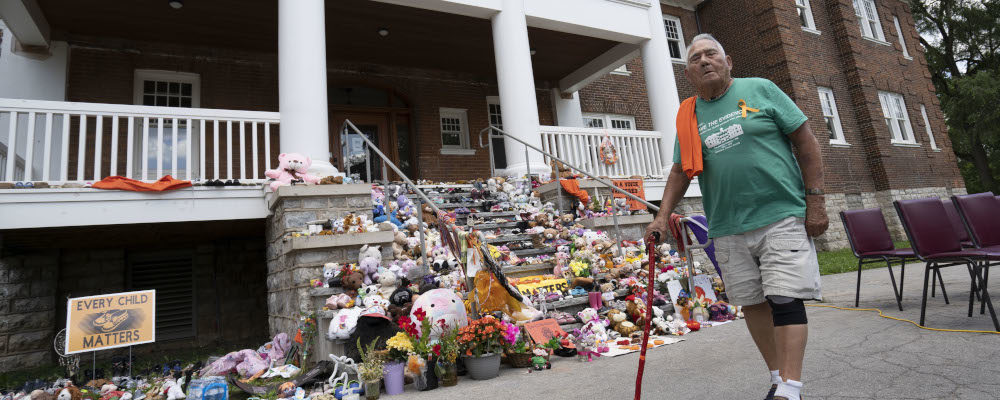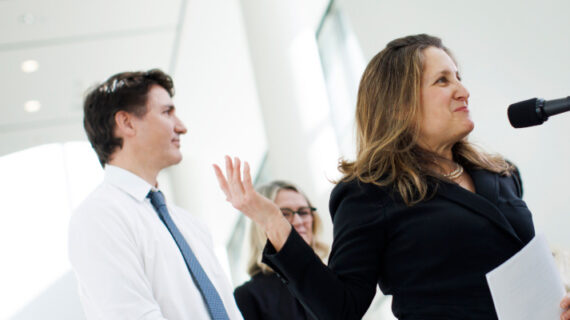The Hub launched with a core mission of getting Canadians thinking about the future. We’ve been stuck in the doldrums, pessimistic and polarized, for too long. To lay out a roadmap for the next 30 years of Canadian life, we asked our contributors to pinpoint the most consequential issue, idea or technology for the country in 2050. This series of essays by leading thinkers will illuminate Canada’s next frontier.
On June 24, 2021, I woke up to the news of 751 more unmarked graves at the former Marieval Indian Residential School in Saskatchewan. This came on the heels of the discovery of 104 graves in Brandon and a mass grave for 215 children, some as young as three years old, in Kamloops. Shortly afterwards, 182 and 160 unmarked graves were identified near Cranbrook and on Kupar Island in British Columbia. Five sites down, with what could be over 1,400 dead children. Over 130 residential school sites are still to be properly searched.
The Truth and Reconciliation Commission of Canada Final Report upon Canada’s Residential Schools: Missing Children and Unmarked Burials estimate of 3,200 children killed by the Residential “School” System is looking awfully, absurdly, rosy.
You’ll forgive me, I hope, if I don’t see Canada’s next frontier as one that will be shaped by a big, shared idea — especially one implemented by the Canadian government — or if I don’t think that trying to identify a single shared direction for the country is something we ought to aspire at all.
This is — emphatically — not a call for a specific response to the horrors of the Residential School System or any of the other failures of the Canadian government identified in the findings of the Truth and Reconciliation Commission. The last thing Indigenous peoples need is another person from outside of their communities talking about what they need. Indigenous peoples have told us what they need, and it’s substantive action, not white saviours.
But that’s still not enough. Non-Indigenous Canadians have a responsibility to understand how on Earth we ended up with a history that threw kidnapped toddlers in the ground. When we say never again, we should mean it. That statement should have teeth.
Against collective aspiration
I agree with the introductory essay of this series that Canada is being held back by the lack of “collective aspiration.” A suffocating administrative state is what holds back substantial change with its insistence on approving any direction we might take. I fervently hope that if Canadians ever again go in one direction, it doesn’t lead to more rows of tiny shoes.
Instead, we should dismantle the institutions that make collective aspiration seem necessary and replace them with respect for all individuals and communities.
Against this vision stand those who worry about what ordinary people, left to their own devices, might do. Canadians have lost faith in each other, but expect that if our aspirations are collective then our goals can be made better than they are individually.
This isn’t totally incoherent. Canadians don’t expect grand visions to be implemented by our neighbours. We expect the government to put experts in charge of choosing and implementing the right collective goals.
The sneering dismissal of the idea that ordinary Canadians — let alone those most disenfranchised — could be fit to make important decisions is on full display every time a Conservative despairs that a drama teacher could be prime minister of Canada and every time a Liberal indignantly remarks that the premier of Ontario doesn’t hold a post-secondary degree. Sneering is mild, though, compared to what happens when experts decide, as Canadian governments did in the late 19th and in the 20th century, that the choices of entire peoples and cultures aren’t good enough.
Expertise is simply no substitute for choosing appropriate goals. The authors of the Gradual Civilization Act of 1857 were our best and brightest. They had big ideas to move the country forward. Duncan Campbell Scott was well-educated with years of relevant experience. He applied both to the goal of eliminating the language, culture, and religions of Indigenous peoples. This is all, undeniably, part of our history, and a dream of unity is part of the reason why.
The problem with collective aspirations, especially when chosen and implemented by privileged experts, is that they will always be chosen by people with power on behalf of those who lack it. Freedom has to apply to everyone, not just the most privileged and credentialed. Freedom for a few isn’t freedom. It’s power, plain and simple. Equality under the law is indispensable if we are going to let people forge their own paths.
What’s the alternative?
People most comfortable with the status quo will be uncomfortable with loosening the reins on people and communities who want things to change. But individuals have a better track record than you think, especially when they’re appropriately and equally constrained by rules and institutions. When people are free, they can accomplish — they have accomplished! — an awful lot.
Elinor Ostrom, winner of the 2009 Nobel Prize in economics, studied how communities solved environmental and resource management problems that experts had decided couldn’t be solved. Unlike European settlers who were too myopic to recognize anything but wilderness when they saw Indigenous polyculture farming, Ostrom approached the communities she studied with respect and curiosity that helped her understand solutions that experts thought shouldn’t exist.
Ostrom helped us understand what makes community rules strong and effective and what makes them fragile or dysfunctional. One type of fragility comes from a higher level of government imposing solutions divorced from the people to which they apply and the things that those people know. Such “solutions” can even create or entrench problems.
Without laws founded in the equality, freedom, and worth of all people and their communities, we’re bound to blind ourselves to the potential, the knowledge, and the solutions of others.
Collective humility, individual boldness
Colonial governance is only one possible avenue that collective arrogance can take. It’s the one most relevant to Canada’s history, and its legacy is shameful.
It’s scary, especially for those who became politically powerful through the status quo, to think about what could happen if people in Canada were allowed to live without oversight and approval. But we should be bold enough, individually, to be collectively humble.
Whether the decision is to allow opening a new sort of business, building a different sort of building, or practicing self-governance, Canadians need to take seriously the costs to people and communities different from us of imagining that we share our most important goals and aspirations. If you’re very fortunate, ignoring these costs might feel like the “doldrums of decadence.” But for others this selfish dream has resulted in generations of trauma that sits with Indigenous peoples to this day.
To see Canada’s next frontier, we must sweep aside all these imposing plans that have left the Canadian majority feeling they’re in the “doldrums of decadence” while leaving marginalized people dealing with generations of bigotry, racism, and trauma.
Indigenous people deserve action, not words, from a government that takes full responsibility, pays reparations, and grants sovereignty. But Canadians should go further and take the teeth out of the very systems that allowed Canadians to think that they ever could or should impose one right way forward.




